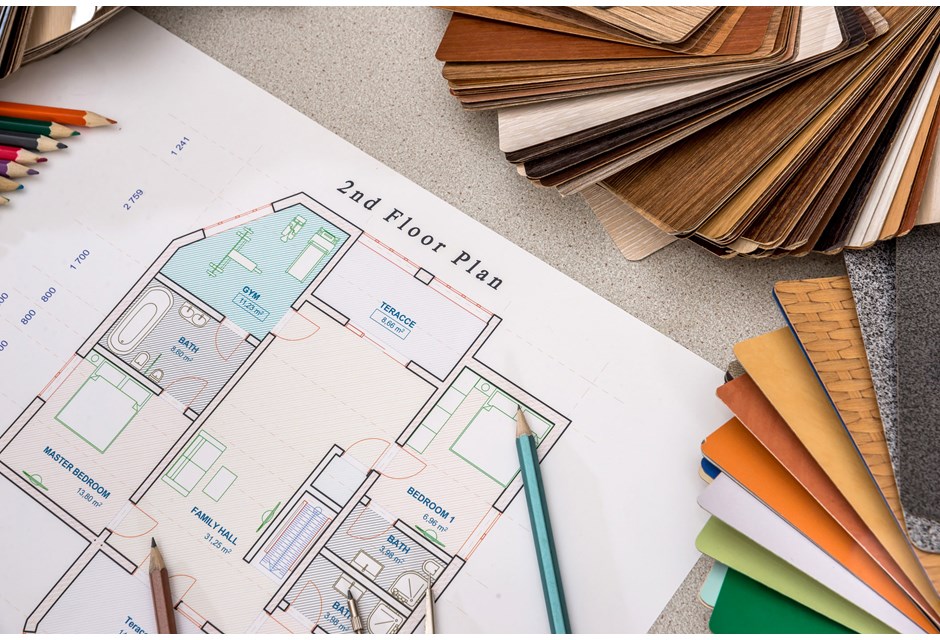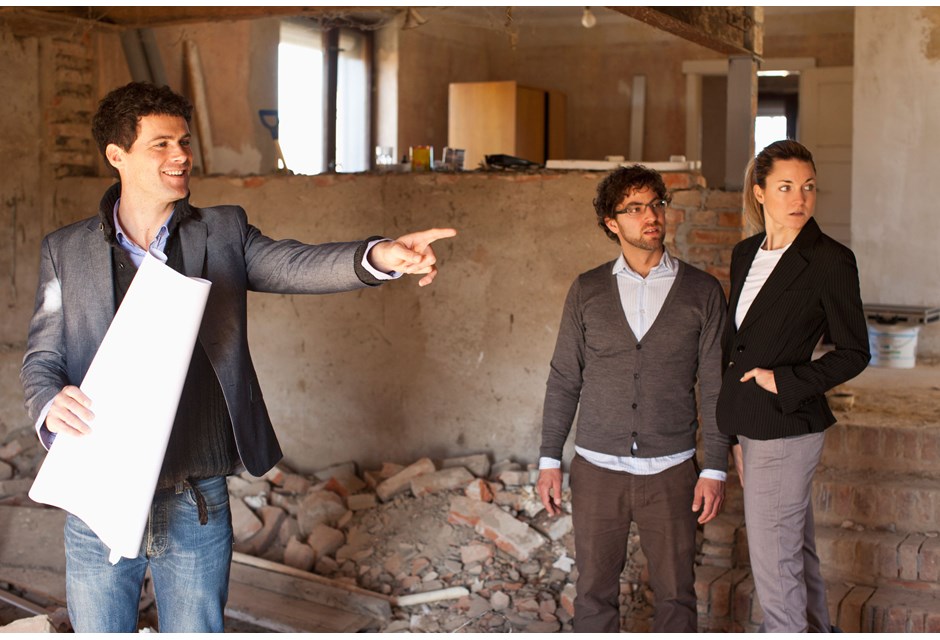Bryan and Sarah Baeumler are one of our favourite couples, especially since she started working for him on his latest series, Bryan Inc. Part of the fun of the show is always seeing some of the last-minute changes Sarah tends to come up with, and how Bryan deals with them. That’s all fine for this seasoned couple, who know how to roll with the renovation punches. But for everyday folks who are about to undergo renovations in their own homes, last-minute changes can lead to unnecessary stress, sky-rocketing budgets and major time delays. If you want to avoid them in your home, here are a few simple strategies to employ.

Formulate a Plan
Before you even go so far as to hammer in a single nail during your renovation, be sure to sit down and formulate a plan. Put pen to paper, use an app or hit up some online renovation sites. However you want to proceed is up to you, but figure out where you’re going and how you want to get there so that you can avoid any unforeseen headaches.

Get Super Detailed
When formulating your plan, don’t just think about the big picture – break down your renovation piece by piece and then create sub-plans for those pieces even, if you must. The more detailed you can get, the more potential problems you will foresee, anticipate, and hopefully avoid.

Set a Timeline
Living through a renovation is tough, but having an end point in front of you always helps. Before you embark on your home fixes be sure to estimate (or even better, overestimate) how much time each step will take so that you can manage your own expectations. Because as we all know, it’s easier to make a hasty decision or last-minute change when we’re under extra or unforeseen stress.

Measure, Measure, Measure
This is the biggest mistake any renovation rookie could ever make: not measuring your space. Whether you’re looking to add furniture, hang a picture or undertake a much bigger project, it’s always a great idea to measure – and to do so more than once. Nothing throws a renovation off course quicker than bad measurements.

Keep the Big Picture in Mind
While it’s a great idea to have as many of the nitty gritty details nailed down as you possibly can in advance, be sure to keep the big picture of what you want in mind when you’re making some of those smaller decisions that come up along the way. It’s easy to get bogged down in the minutia of it all, but it’s not always practical when you’re on a timeline.

Grab Lots of Samples
Just because a swatch looked great in the store doesn’t mean it will look great in your home. That’s why it’s always a great idea to take samples from the store and bring them back to your site. Having them in your space will give you a much better idea of how they’ll work out in the long run.

Test Your Colours
The colour of your space goes a long way in determining the tone, theme and personality of a room, so you want to get it right. Rather than investing all your cash in a colour that looks great at the store, take a few samples in the hue you’re looking at back to your renovation site and then throw some on the walls. You’ll get a much better idea of what works, plus you won’t end up having to repaint later on down the line when you realize the shade isn’t quite what you’d hoped for.

Going with Too Many Trends
When you’re first setting out to design or renovate a space it’s easy to get overwhelmed by some of the gorgeous trends out there. The problem though is that some trends don’t mix and match; we all love a shiplap wall, but should it be paired with wallpaper? To help decipher which trends fit your personality, consider putting together a Pinterest board ahead of time to really pinpoint what you like.

Talk it Out
Whether you’re doing a renovation with a contractor, your partner or a roommate, consider setting up weekly or even daily check-ins so that you can keep the lines of communication open. It’s easy to get off track when you fall off the same page, but it’s even easier to avoid with a little communication.

Get Recommendations
Unless you’re a contractor who does renovation-type things for a living, you might want to consider vetting the people you use for certain aspects of your redesign. And when it comes to vetting, what’s better than word of mouth? Community Facebook groups are a great way to source the right people you need to do a job right, and they usually come at the most reasonable prices, too.

Listen to Your Contractor
Once you do decide on the right man (or woman) for the job, be sure to listen to their input and trust their expert opinion. After all, you’ve done your homework by making sure they’re up to the task. Why not let them do their magic?

Seek Help
If you don’t have a contractor and are heading up the renovations yourself, don’t be afraid to ask for help when things become overwhelming or if you run into a situation you can’t handle on your own. It’s better to squash a potential problem early on by admitting you’re unsure rather than forging ahead and doing something wrong or perhaps even dangerously.

Do Your Research
If you’re anything like us and you’re addicted to home renovation shows, you’ll know that sometimes these pros make things look so much easier than they actually are. Rather than assume you know the cost or timeline of certain projects or upgrades, make sure you actually call around, get quotes and learn what’s involved. Otherwise you could end up blowing your time, energy and money on something small that should have been a breeze in the grand scheme of things.

Avoid Making Last Minute Decisions
Sometimes a renovation can feel so large that you actually don’t want to be tied down to the little details just yet. And so you leave the selection of certain finishing elements until later on down the line. That might not be the best idea, because it then opens the door for other last-minute changes. When you know what’s coming down the pike you’re a lot more likely to stay on track.

Respect the Original Architecture
You may want to create an open concept feel in your home, but if your home doesn’t have the bones to support that structure you could run into large, potentially dangerous problems down the line. Before you become married to a certain idea, learn what’s actually possible and then try to work with your preexisting structure; you’ll be a lot less likely to change the game plan after you get going.

Overestimate Your Budget
So you’ve done your research, sourced your materials, put together a timeline and hired all the right people. That means you should know how much things are going to cost, right? Wrong. Projects always run into delays and unforeseen costs. That’s why it’s a good idea to add at least 20 per cent to any estimated budget you may have. Best-case scenario is that you have a little bit leftover in the kitty when all is said and done, but isn’t it better to overestimate than underestimate? We certainly think so.
HGTV your inbox.
By clicking "SIGN UP” you agree to receive emails from HGTV and accept Corus' Terms of Use and Corus' Privacy Policy.




